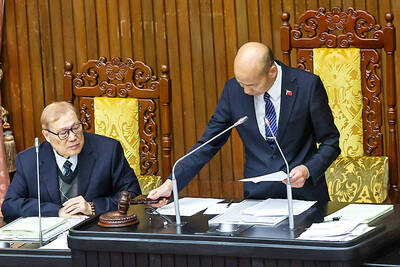The announced shutdown of a German factory by Finnish mobile phone maker Nokia, following the departure of Motorola and BenQ (
An "abysmal scandal" for the IG Metall trade union, Nokia was slammed as a "locust" on Wednesday by the regional premier of North-Rhine Westphalia, where the Nokia plant is located in the western city of Bochum.
The German government expressed understanding for "workers' disappointment and anger" as the shock of the news rippled across the country.
"Due to market changes and increasing requirements for cost-effectiveness, production of mobile devices in Germany is no longer feasible for Nokia," executive vice president Veli Sundback had said on Tuesday.
Nokia was not the first to reach that conclusion, but it might be the last.
US manufacturer Motorola said last year that its mobile phone plant in Flensburg, near the Danish border and once one of the most modern in Europe, would be dismantled.
Siemens, the only Germany manufacturer, sold its mobile unit to BenQ of Taiwan in 2005.
A year later, BenQ Mobile filed for bankruptcy, condemning its two German factories.
Faced with high labor costs in Germany, Nokia is moving to Romania.
The decision means 2,300 posts will be eliminated in Bochum, to which IG Metall adds 1,000 part-time workers.
On top of that, the regional daily Rheinische Post said another 1,000 jobs were threatened at companies that did sub-contracting work for Nokia.
DHL, the logistics group, has already said it might be forced to lay off workers.
Some 200 are involved in tasks centered on Nokia shipments, in particular those of finished mobile handsets.
The Finnish company said it would try to help workers affected by the closure, but that hasn't carried much weight with German politicians.
North-Rhine Westphalia regional premier Juergen Ruettgers called Nokia a "locust which got money in Germany and then said without warning `we are going to Romania' to maybe get more public funds there."
He was to speak with Nokia workers later on Wednesday.
The western German state provided Nokia with 60 million euros (US$90 million) in aid, to which the federal government added US$20 million, Ruettgers said.
German Deputy Economy Minister Hartmut Schauerte added: "We are going to check with the European Commission if the relocation of this site is being supported financially by European structural funds.That must not be the case."
It appeared however that that might be the only way to seriously contest Nokia's decision.
IG Metall has warned of unspecified "resistance," while Schauerte said Berlin was prepared to meet with Nokia representatives if the group was willing to reconsider its decision.
But German deputy Andrea Nahles, a leading figure on the German left, acknowledged that "we cannot change a business decision at the political level."

DEFENDING DEMOCRACY: Taiwan shares the same values as those that fought in WWII, and nations must unite to halt the expansion of a new authoritarian bloc, Lai said The government yesterday held a commemoration ceremony for Victory in Europe (V-E) Day, joining the rest of the world for the first time to mark the anniversary of the end of World War II in Europe. Taiwan honoring V-E Day signifies “our growing connections with the international community,” President William Lai (賴清德) said at a reception in Taipei on the 80th anniversary of V-E Day. One of the major lessons of World War II is that “authoritarianism and aggression lead only to slaughter, tragedy and greater inequality,” Lai said. Even more importantly, the war also taught people that “those who cherish peace cannot

STEADFAST FRIEND: The bills encourage increased Taiwan-US engagement and address China’s distortion of UN Resolution 2758 to isolate Taiwan internationally The Presidential Office yesterday thanked the US House of Representatives for unanimously passing two Taiwan-related bills highlighting its solid support for Taiwan’s democracy and global participation, and for deepening bilateral relations. One of the bills, the Taiwan Assurance Implementation Act, requires the US Department of State to periodically review its guidelines for engagement with Taiwan, and report to the US Congress on the guidelines and plans to lift self-imposed limitations on US-Taiwan engagement. The other bill is the Taiwan International Solidarity Act, which clarifies that UN Resolution 2758 does not address the issue of the representation of Taiwan or its people in

The Philippines yesterday criticized a “high-risk” maneuver by a Chinese vessel near the disputed Scarborough Shoal (Huangyan Island, 黃岩島) in a rare incident involving warships from the two navies. The Scarborough Shoal — a triangular chain of reefs and rocks in the contested South China Sea — has been a flash point between the countries since China seized it from the Philippines in 2012. Taiwan also claims the shoal. Monday’s encounter took place approximately 11.8 nautical miles (22km) southeast” of the Scarborough Shoal, the Philippine military said, during ongoing US-Philippine military exercises that Beijing has criticized as destabilizing. “The Chinese frigate BN 554 was

LEISURE: The new law adds Confucius’ birthday, the anniversary of the Battle of Guningtou, Constitution Day and Little New Year as national holidays The Legislative Yuan yesterday passed new legislation adding four national holidays and making Workers’ Day a national holiday for all sectors. The Chinese Nationalist Party (KMT) and the Taiwan People’s Party used their combined majority in the legislature to push the jointly proposed draft through its third and final reading. This new law supersedes the existing regulations for the implementation of memorial days and state holidays, which are administered by the Ministry of the Interior. The new law recognizes Confucius’ birthday on Sept. 28, the anniversary of the Battle of Guningtou on Oct. 25, Constitution Day on Dec. 25 and “Little New Year,”